Autumn Statement: Osborne reveals stamp duty reforms
- Published
- comments
George Osborne says the stamp duty in changes his Autumn Statement will benefit 98% of homebuyers
George Osborne has said stamp duty will be cut for 98% of homebuyers in his Autumn Statement, external to the Commons.
The chancellor said that from midnight the current system, where the amount owed jumps at certain price levels, would be replaced by a graduated rate, working in a similar way to income tax.
He admitted borrowing would be higher than forecast but claimed the UK would be "into the black" by 2019/20.
Labour said his deficit reduction targets were "all in tatters".
BBC political editor Nick Robinson said the headline announcements were "real electioneering" by the Conservative chancellor.
The new rates will apply in Scotland until 1 April next year, when the Land and Buildings Transaction Tax replaces stamp duty there.
The Autumn Statement - which was called the pre-Budget report under the previous Labour government - is a chance to flag future tax and spending plans as well as set out the state of the nation's finances.
In other measures:
A 25% "diverted profits" tax - often called a "Google tax" - would be aimed at multinational companies
Air Passenger Duty, external for children under 12 would be abolished next year, and under-16s from the following year
Bank profits which can be offset by losses for tax purposes would be limited to 50%
An extra £2bn would be put into health services across the UK
VAT for hospices and air ambulances would be refunded
Fuel duty would be frozen
The UK would play a "lead role" in a European mission to Mars
Investment in businesses, academies, research and culture to create a "northern powerhouse" in England
There would be a review of business rates to help High Street stores take on internet firms
People will be able to pass on their tax-free ISA allowances to spouses when they die
There would be a new £90,000 charge for people who are non-domiciled in the UK for tax purposes but have lived there for 17 of the past 20 years
The higher rate income tax threshold would rise to £42,385 next year
In its report , externalaccompanying the statement, the Office for Budget Responsibility (OBR) said the government's overall plan was to reduce public spending from £5,650 per head in 2009-10 to £3,880 in 2019-20.
Some 60% of this reduction was still to come in the next parliament, it said.
OBR chairman Robert Chote predicted a "very sharp squeeze" on public service spending in the next parliament based on the figures available.
The new stamp duty rates at different band levels will only apply to the part of the property price that falls within that band, so there will no longer be a huge jump in stamp duty, for instance, on a property costing £500,001.
Under the new rules, no tax will be paid on the first £125,000 of a property, followed by 2% on the portion up to £250,000, 5% on the portion between £250,000 and £925,000, 10% on the next bit up to £1.5 million and 12% on everything over that.
People currently in the process of purchasing a home could choose which regime to operate under, Mr Osborne said.
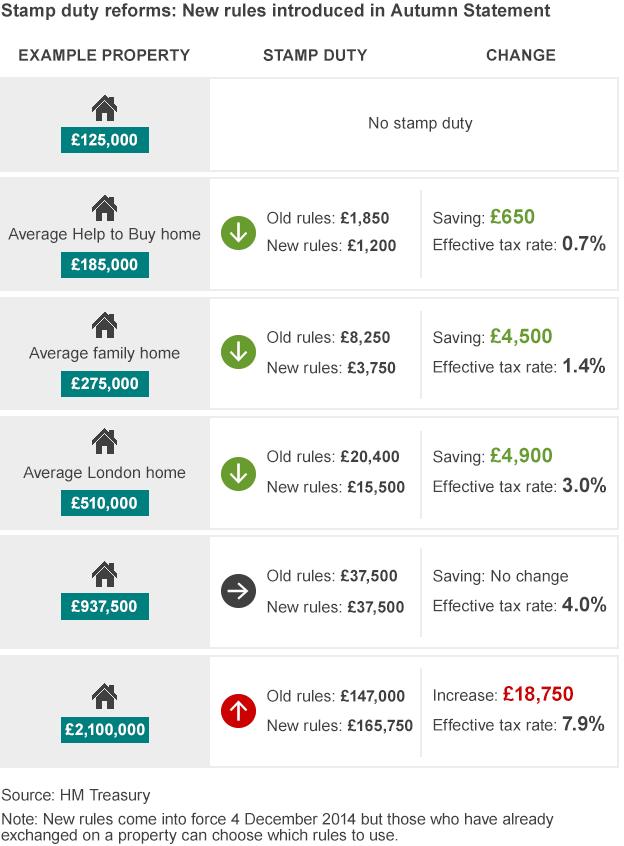
The Treasury said someone buying a property at the average family home price of £275,000 would save £4,500, while a £2.1m purchase would carry £18,750 more stamp duty compared with the old system.
Mr Chote said the reform could put up house prices in some areas, predicting prices would rise where the tax had fallen, and fall where it had risen.
Mr Osborne said the tax cut, which is UK-wide until April when stamp duty is devolved to Scotland, was worth £800m a year.

Analysis: By Nick Robinson, BBC political editor
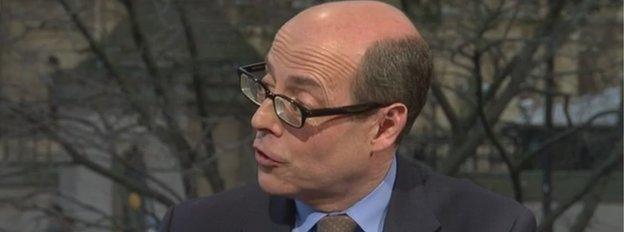
In all but name this was a pre-election Budget.
From his first to his last sentence - from boasting about Britain's growth to unveiling the Coalition's version of the mansion tax - Chancellor George Osborne delivered his Autumn Statement with not just one eye but both fixed firmly on polling day.

Earlier, MPs were told UK growth was set to be 3% this year, higher than Germany, but falling to 2.3% by 2019.
The chancellor said the measures he was announcing in the statement were "not a giveaway", saying overall they would tighten the public finances but warning "substantial savings" in public spending were still needed.
Mr Osborne said the government had inherited an economy "on the brink" but said the deficit was half what the government had taken on.
Government borrowing is forecast at £91.3bn this year, then £75.9bn, MPs were told. In March the forecast for this year was for borrowing of almost £87bn.
"The deficit is falling this year and every year," Mr Osborne said, although he added that "warning lights are flashing over the global economy".
Ed Balls MP: "Every target missed, every test failed, every promise broken"
Labour said the chancellor had failed to keep his 2010 general election promise to balance the books.
Shadow chancellor Ed Balls said the increase in borrowing was in "black and white, hard evidence", saying Mr Osborne had questions to answer about living standards, wages and tax receipts.
He said: "People are worse off and the fact is he has failed to balance the books in this parliament".
Only Labour could "balance the books in a fair way", he added.
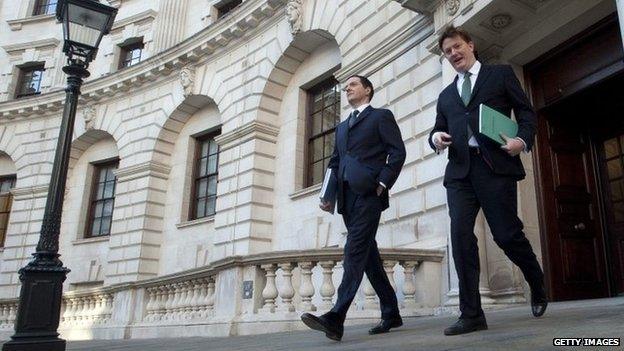
George Osborne and Danny Alexander leaving for the Commons
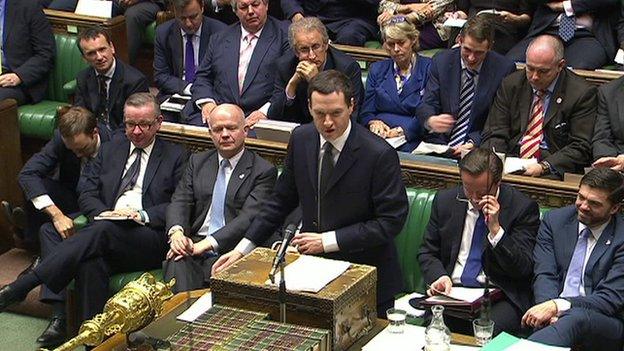
Mr Osborne's statement followed Prime Minister's Questions
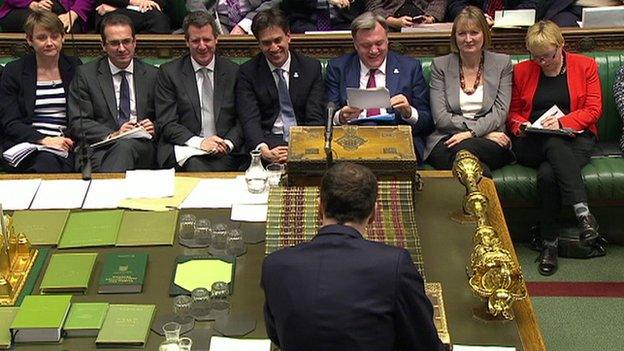
Ed Miliband and Ed Balls enjoy a George Osborne joke
Lib Dem Deputy Prime Minister Nick Clegg was absent from the Commons for the Autumn Statement, as he was on a regional visit to Cornwall.
Sources close to Mr Clegg have dismissed suggestions , externalhe missed it because he no longer wants to be seen sitting next to David Cameron or George Osborne in Parliament.
A Lib Dem Treasury source said it was "nonsense", saying the deputy prime minister was "out in the country, meeting people who will benefit from the Autumn Statement".
'A different view'
Although the measures announced in the Autumn Statement are coalition government policy, it emerged that Lib Dem Business Secretary Vince Cable had written to the OBR, external expressing "growing concern" that the difference between forecasts based on coalition policies and projections for future years - where spending decisions had not yet been made - was not being made clear.
In its response to the letter, the OBR said the distinction was made "very clear", saying it based its forecasts on current government policy.
Speaking to Sky News, Mr Cable said he had no reservations about the Autumn Statement but emphasised that the Lib Dems had a "different approach" from that of their Conservative coalition colleagues on how to proceed with deficit reduction in the next parliament.
"They are making claims about tax cuts we have said are simply not realisable. There will be an argument about the different mix of public spending and taxation," he said.
He added: "It's very difficult to see how the Conservatives can achieve their objectives of protecting those core services and their policies on tax. They don't add up, there is a different view and we should be expressing it."
The Lib Dem business secretary has told his officials not to engage "at this stage in rounds of negotiation on public spending cuts which are the proper responsibility of the next government".
Lib Dem Chief Secretary to the Treasury Danny Alexander told the BBC's Daily Politics borrowing was falling "less fast than expected in March", putting this down to "weaker than expected tax receipts".
However, he said the UK was doing "far, far better" than almost any other major economy.


The Institute of Directors said it was a "disciplined, long-term" statement from Mr Osborne, while the CBI said "real challenges" lay ahead to reduce public spending.
UKIP economic spokesman Patrick O'Flynn said: "The brutal truth is that the government has comprehensively failed in its central mission to wipe out the deficit."
Green Party leader Natalie Bennett said Mr Osborne was "continuing the demonstrably false claim that our deficit problems can be blamed on government spending and welfare".
George Osborne: "Our ambition is to create a northern powerhouse as a complement to the strength of our capital city"
Evan Davis hears the analysis of Newsnight's Duncan Weldon, Allegra Stratton and Chris Cook
The Scottish National Party's deputy leader Stewart Hosie said the statement was the "continuation of a failed austerity programme", adding: "We saw today the consequences of London taking economic decisions for Scotland."
Plaid Cymru's Treasury spokesperson, Jonathan Edwards, welcomed agreement to devolve control over business rates to the Welsh government, but said there was "little here on offer to our nation".